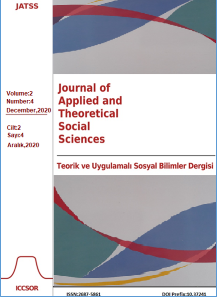Covid-19 Virüsünün Hane Halkı Üzerine Etkisi: Mersin ilinin Diğer İllerle Karşılaştırmalı Analizi
Özet
Küresel bir salgına dönüşen Covid-19 virüsü yalnızca sağlık krizi değil, ekonomik ve politik krizlere de dönüşmektedir. Küreselleşme seviyesi salgını küresel salgın (pandemi) haline hızla getirmiştir. Covid-19 virüsü, II. Dünya Savaşı’ndan sonra yaşanan en büyük küresel ekonomik krize dönüşme tehlikesini beraberinde getirmiştir. Salgınla mücadelede oluşturulacak politikalar, ülkelerin ekonomik süreçlerini çok önemli oranda etkileyecektir.
Salgının ekonomik etkisini daha ayrıntılı incelemek, ekonomi politikası için önemli bir referans olacaktır. Bu çalışmanın amacı, Covid-19 virüsünün Mersin’de 2020 yılının Nisan ve Mayıs aylarında hanelerin ekonomik etkilerini incelemektir. Bu çalışmada internet ortamında 1058 hane ile anket yapıldı. Ankete Katılanların %40’ını (421 hane) Mersin’de yaşayan haneler oluşmaktadır. Aynı zamanda toplam 55 farklı ilden katılımı sağlandığı için Mersin ilinin diğer illerle karşılaştırma imkânı sağlamaktadır.
Yapılan analiz sonucu, Mersin ilinde Covid-19 sonrası hanelerin %55,1’inde gelir kaybı olduğu belirtilmiştir. Covid-19 öncesi Mersin’de geniş işsizlik oranı yaklaşık %23 olarak hesaplanırken, Covid-19 sonrası bu oran %33,3’e yükselmiştir. Mersin ilindeki Covid-19 sonrası işsizlik artışı ankete katılan diğer iller ortalamasından daha yüksek olmuştur. Pandemi ile birlikte, istidamın önemli oranda yükünü taşıyan KOBİ’lerle ilgili yeni ekonomik paketlerin açıklanması işsizlikle mücadelede ciddi destek olacaktır. Bu desteklerin, özellikle istihdam yükünü artıracak sektör ve bölgelere göre farklılaşması, pandemi sonrası ülkede resesyon riskini de azaltabilir.
##plugins.generic.paperbuzz.metrics##
Referanslar
Aktaş, Erkan.2020. Korona Virüsü ile Birlikte Hızla Artan Uzaktan Eğitim, Oluşan Yeni Sorunlar: Mersin Üniversitesinin ve Diğer Üniversitelerle Karşılaştırılması. Mersin Akademi Yayınları - ISBN: 978-605-06753-7-5 – İnsan-Toplum -Bilim.
Baldwin, Richard . (2020). The Supply Side Matters: Guns Versus Butter, COVID-Style. https://voxeu.org/article/supply-side-matters-guns-versus-butter-covid-style
Bayar, Ayşe Aylin.,Günçaydı, Öner, Levent,Haluk,2020. Covıd-19 Salgınının Türkiye’de Gelir Dağılımına Etkisi Ve Mevcut Politika Seçenekleri. İstanbul Politik Araştırmalar Enstitüsu. İstanbul
Demir, İbrahim, 2020. Kovid-19 Salgının Seyri ve Türkiye Ekonomisi. Uluslararası İlişkiler ve Stratejik Araştırmalar (ULİSA) Enstitüsü.
Dündar, Merve. 2020. COVID-19’un Tüketici Harcamalarına Etkisi. Türkiye Ekonomi Politikaları Araştırma Vakfı Değerlendirme Notu.
DİSKAR,2020 İşsizlik ve İstihdam Görünümü Raporu –Nisan 2020. http://disk.org.tr/2020/04/nisan-2020-issizlik-ve-istihdam-raporu-pandemi-oncesinde-issizlikte-vahim-tablo/ Erişim Tarihi:19.10.2020
Donald, A., B. ve Lindgren, B. W., (1996) Statistics: Theory and Methods. 2nd. Edition, Wadsworth Publishing Company, California.
Kartal, Mahmut. (1998) Bilimsel Araştırmalarda Hipotez Testleri, Parametrik ve Nonparametrik Teknikler, 2. Baskı. Şafak Yayınevi. Erzurum.
Uysal Gökçe, Mutluay Hamza ve Şahin Mehmet Cem, 2020. COVID-19 Pandemisinin İşgücü Piyasasında Yarattığı Tahribat Nasıl Takip Edilmeli? İPM–MERCATOR POLİTİKA NOTU. Haziran 2020. https://ipc.sabanciuniv.edu/tr/yayinlar?cat=T%C3%BCm%20Yay%C4%B1nlar&year=T%C3%BCm%20Y%C4%B1llar&page=2. Erişim Tarihi:20.10.2020.
Taymaz, Erol. (2020). COVID-19 Tedbirlerinin Türkiye Ekonomisine Etkisi Ve Çözüm Önerileri. https:// sarkac.org/2020/04/covid19-tedbirlerinin-turkiye-ekonomisine-etkisi-cozum-onerileri/
TÜİK,2019. Gelir ve Yaşam Koşulları Araştırması 2019. http://www.tuik.gov.tr
TÜİK,2020a. İstatistiklerle Aile 2019" bülteni. http://www.tuik.gov.tr
TÜİK,2020b. İşgücü İstatistikleri. http://www.tuik.gov.tr
Voyvoda. Ebru, Yeldan Erinç, 2020. COVİD-19 Salgının Türkiye Ekonomisi Üzerine Etkileri ve Politika Alternatiflerinin Makroekonomik Genel Denge Analizi. file:///C:/Users/Asus/Downloads/covid_voyvodayeldan_v2_31mayis.pdf






















